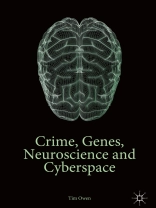This book applies Owen’s unique genetic-social framework to the study of crime and criminal behaviour, with an emphasis on cybercrime. Moving beyond challenges which confront contemporary criminological theorizing such as: the stagnation of critical criminology, the relativistic nihilism of the ‘cultural turn’, posthumanism, and virtual criminology, the author codifies and ‘applies’ the latest version of the framework to the study of crime, both in and out of cyberspace.
Drawing upon evolutionary psychology, behavioural genetics and the philosophy of Heidegger, he introduces new terms such as ‘Neuro-Agency’ and notions of Embodied Cognition into criminological theorizing. Adopting a soft compatibilist approach to free-will, and Realist ontology, Owen’s meta-theoretical focus provides a new direction for criminological theorizing, in particular in the direction of the conceptualization and prediction of cyber violence. Exciting and timely, this book willappeal to scholars and advanced students of criminology, law, sociology, social policy, psychology, philosophy, policing and forensic investigation.
Cuprins
Chapter One. Introduction.- Chapter Two. Criminological and Social Theory: Surveying the Contemporary Landscape.- Chapter Three. Neuroscience and Cybercrime.- Chapter Four. Do We Need a ‘Virtual Criminology’?.- Chapter Five. Cyber Violence.- Chapter Six. Codification and Application of the Genetic-Social Framework.- Concluding Observations
Despre autor
Dr Tim Owen is Senior Lecturer in Criminology and Director of Uclan Cybercrime Research Unit [UCRU] at the University of Central Lancashire, UK. He is the author of many articles, book chapters and books in criminology, sociology and social policy. Recent books include
New Perspectives on Cybercrime, co-edited with Wayne Noble and Faye Speed (Palgrave, 2017).












